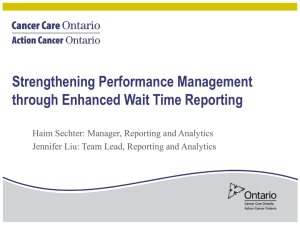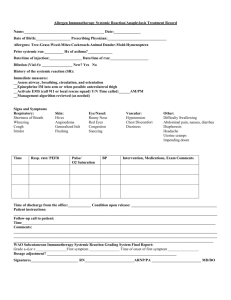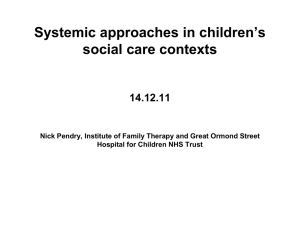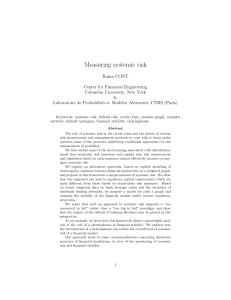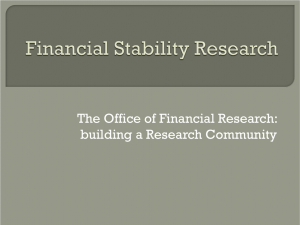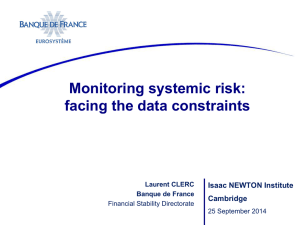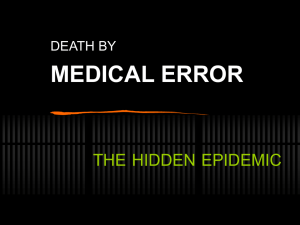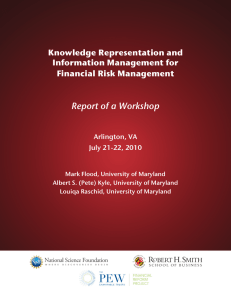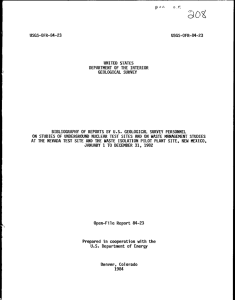Managing Systemic Risk Within the Financial Markets IQIS 2010 MIT, July 21, 2010
advertisement
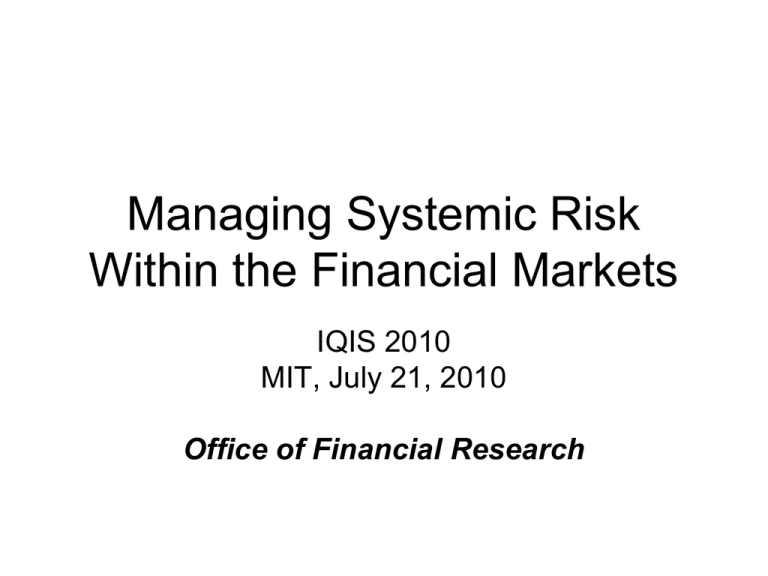
Managing Systemic Risk Within the Financial Markets IQIS 2010 MIT, July 21, 2010 Office of Financial Research What is Systemic Risk • No clearly accepted definition • G10 Report on Consolidation in the Financial Sector (2001) – • George G. Kaufman and Kenneth E. Scott (2003) – • Systemic risk refers to the risk or probability of breakdown in an entire system, as opposed to breakdown in individual parts or components, and is evidenced by comovements (correlation) among most or all of the parts BIS/IMF/FSB for the G20 – • Systemic financial risk is the risk than an event will trigger a loss of economic value of confidence in, and attendant increases in uncertainty about, a substantial portion of the financial system that is serious enough to quite probably have significant adverse effects on the real economy A risk of disruption to financial services that is caused by an impairment of all or parts of the financial system, and has the potential to have serious negative consequences for the real economy European Central Bank – The risk of experiencing a strong systemic event. A systemic event is one that adversely affects a number of systemically important intermediaries or markets (including potentially related infrastructures). The trigger of the event could be an exogenous shock (idiosyncratic, i.e., limited in scope or systematic, i.e. widespread), which means from outside the financial system. Alternatively, the event could emerge endogenously from within the financial system at large. The systemic event is strong when the intermediaries concerned fail or when the markets concerned become dysfunctional. 2 Systemic Risk – Financial Markets Definitions Common Underlying Theme System-wide Loss of Capacity 3 Conjecture • (Financial Market) Systemic Crisis in the past has always been accompanied by or resulted from a loss of confidence in the banking system. 4 Second Conjecture • The Next Systemic Crisis be caused either by a loss of confidence in the banking system or a failure of the infrastructure (electronic attacks) 5 Notes On the Proposed Office of Financial Research • Confidence In The Security Of The Market Place, Good Faith In the Performance of Contracts, and Fair Dealing In Transactions Are Necessary For a Well Functioning Market 6 Notes On the Proposed Office of Financial Research • Confidence! 7 Notes On the Proposed Office of Financial Research • Good Regulations and Strong Enforcement by Regulators Inspires Confidence and Promotes Greater Market Security • Corollary is Also True • Bad Regulations and Ineffective Enforcement Weakens Confidence 8 Notes On the Proposed Office of Financial Research • Effective Regulation Requires Good Information • Good Information = F(Data,Research,Analytics) • OFR = ( Data, Research, Analytics ) 9 Research • Research Focus – Understanding Flows of Funds and Information (Market Operation) – Factors That Drive Risk Premia – Sources of Potential Systemic Weakness • Counterparty Network and resulting flow of funds • Identifying Market Risk Factors (looking for gross sector imbalances) • Basic Funding Structure – reliance on short term funding and liquidity • Infrastructure – security of the systems by which trade information is passed (includes high frequency electronic trading and security of account information) • Understanding leverage trends 10 OFR From The Beginning • Need – Early recognition that the US (world) did not have the data to adequately prevent or manage the devastating financial crisis we are experiencing – Quickly conclude that it was not simply lack of data, but more specifically lack of information (data, theory, analytics) – Data Without Supporting Research and Analytics Has Little Value – Research and Analytics Without Supporting Data Has Little Value • National Institute of Finance • Office of Financial Research 11 Data • Research Focus – Understanding Flows of Funds and Information (Market Operation) • Data Required: Trade Flows, Collateral Flows, Funding Flows – Factors That Drive Risk Premia • Data Required: ??? (Market Histories, Liquidity measures) 12 Data • Research Focus – Sources of Potential Weakness • Counterparty Network and resulting flow of funds – Counterparty by Counterparty, position by position daily data. • Identifying Market Risk Factors (looking for gross sector imbalances) – Firm by Firm Positions with Daily Transaction updates • Basic Funding Structure – reliance on short term funding and liquidity – Firm specific transaction and funding data • Infrastructure – security of the systems by which trade information is passed (includes high frequency electronic trading and security of account information) – Exchange and Dark Pool buy and sell orders • Understanding leverage trends – Detailed deal description data – firm position data 13 Research • Multi-Disciplined – Economics, Finance, Mathematics, Statistics, Psychology, Computer Science, Physics… • Recognize the Global Nature of Systemic Risk • Three Structures – In-House – Fellowship Program – Academic Grants 14 Research & Analytics In-House • Data Quality • Develop and Implement Specialized security models • Develop and Implement Systemic Risk Metrics • Crisis Simulations – testing crisis resolution plans • Consulting research for the Risk Council 15 Research & Analytics Fellowship Program • Training & Internal OFR consulting • Major Projects (Network Research, Identification and Analysis of Leverage) • Data Intensive Research • Develop and Implement Specialized security models 16 Research & Analytics Sponsored Research (Academic) • Research Institutes • Fundamental Market Research • Development of Theory • Modeling the Markets • Special Research Projects • Developing Risk Metrics • Crisis Post Mortems • Infrastructure Security • Tend to Be Less Reliant on Granular Data • Rely upon In-House Staff for testing that requires granular data • Work Closely with Fellows and In-House staff. 17 Office of Financial Research (OFR) • Where We Stand? 18 OFR From The Beginning • Committee to Establish a National Institute of Finance ce-NIF – True Case Study in successful Grass Roots project – Identify a need, build community support with diverse skills (Data Architecture, Financial Research, Legislative Process) 19 OFR ce-NIF • Key Players – Too Many To List Them All – Apologies to those not listed. – John Leichty (Penn State, Statistics Professor), Mark Flood (Economist), Mark Reesor (U. Ontario, Mathematics), Allan Mendelowitz (Expert on Legislation and Governmental Operations), Harry Markowitz (Nobel Prize, Economics), Jay Dweck (Morgan Stanley, Data and Information Systems), Mike Atkin (EDM Council, Data Expert), John Bottega (Chief Data Officer, NY FRB), Alan King (IBM), Jack Reed (US Senator), Bob Corker (US Senator), Mark Warner (US Senator) 20 OFR •Thank You 21 22
